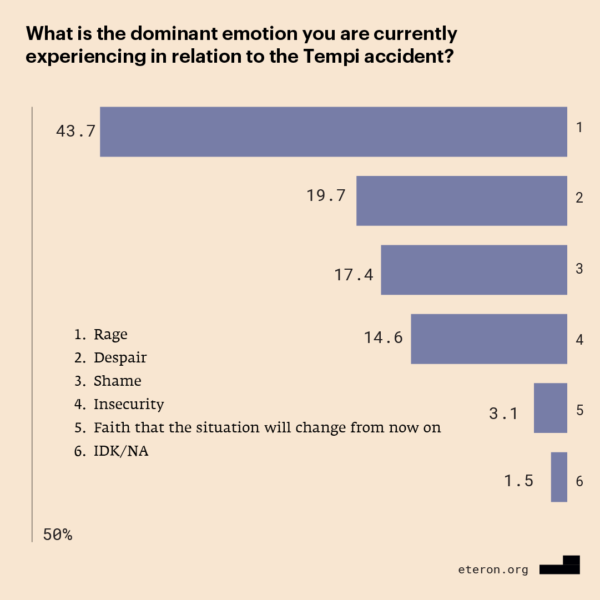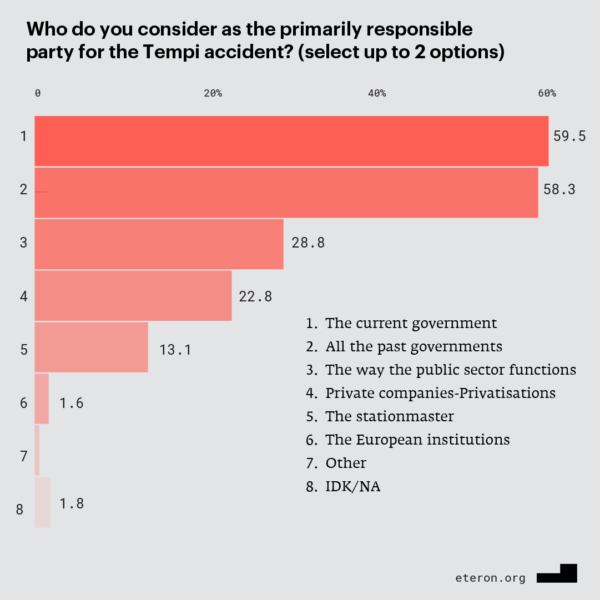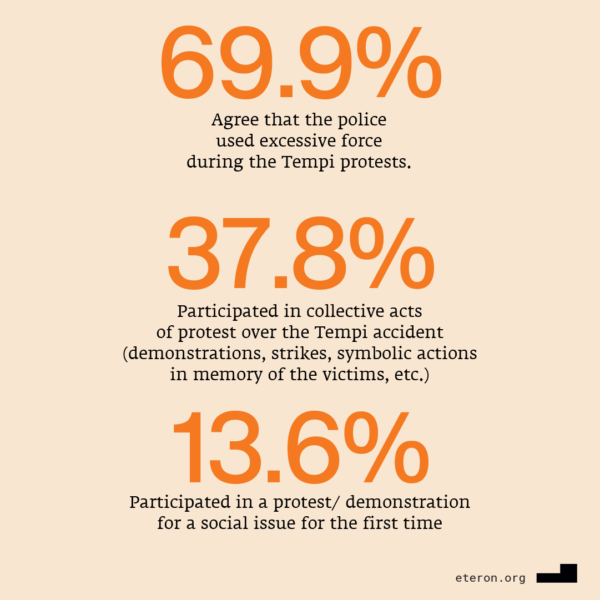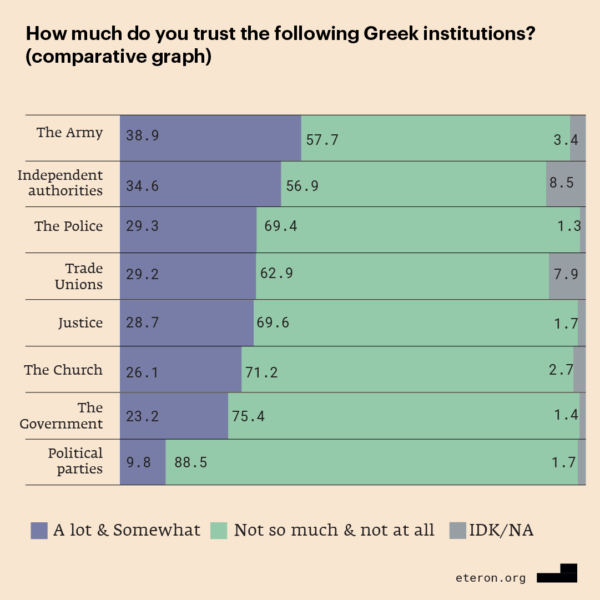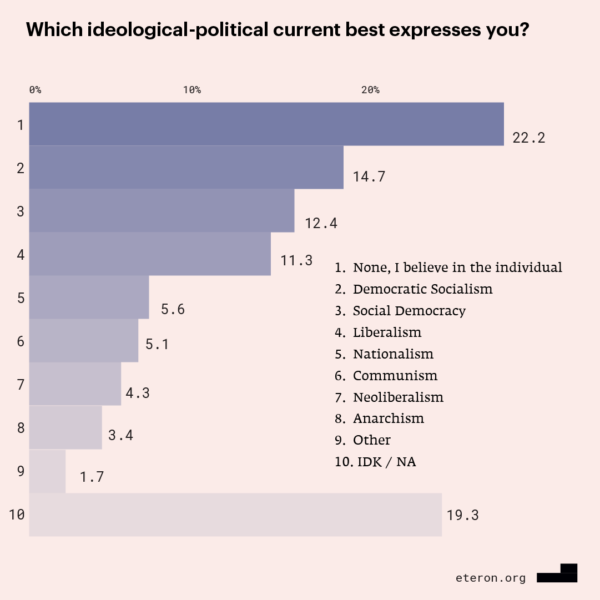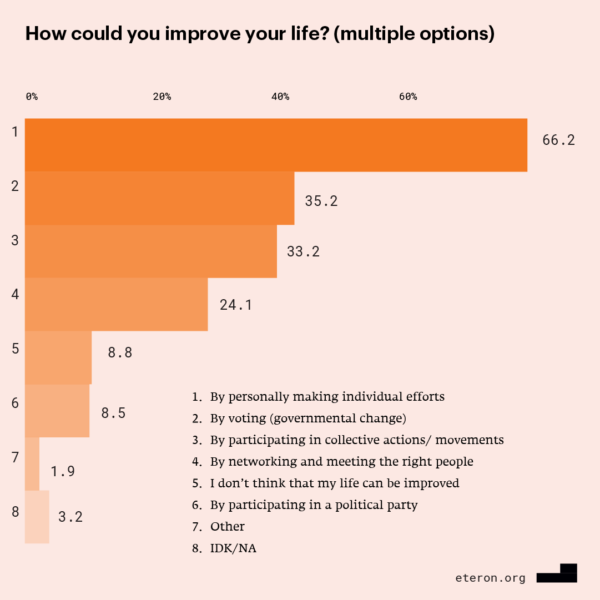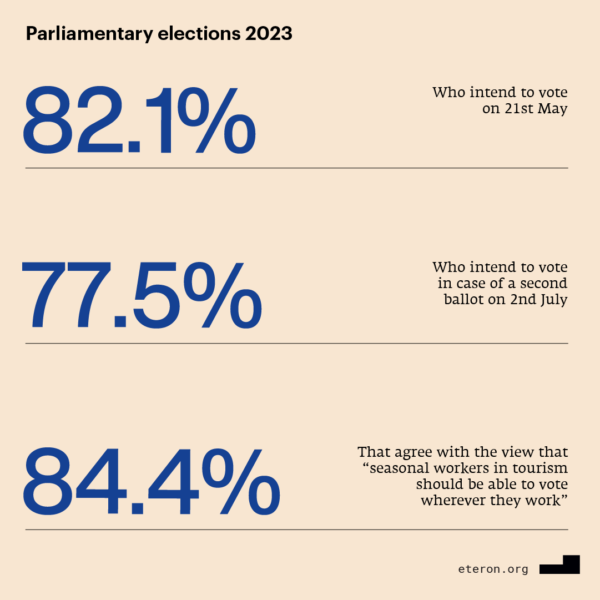
Eteron Research – The Young Generation after the Tempi Train Disaster
Eteron presents its research titled “The New Generation after the Tempi Train Disaster”, which aims to record the prevailing trends amongst the younger generation after the deadliest train accident ever recorded in Greece. It is a quantitative research conducted under the scientific supervision of Loukia Kotronaki, lecturer and postdoctoral researcher at the Department of Political Science and History of Panteion University. The survey was carried out across Greece in April 2023 (12 – 19 April) and the data was collected by aboutpeople.
The research comes as part of Eteron’s new project “Youth – Voice On”, which is a continuation of the “Gen Z – Voice On” project, focusing on a wider age range of young people aged 17-34. Its findings add to our perspective on young people’s participation in protest actions following the tragic accident and the broader effects they may have on social and political processes.
As Eteron’s Director, Gabriel Sakellaridis stated, “The tragic accident in Tempi caused a wave of moral shock in Greek society and released a range of strong negative emotions. Young people were the social group that experienced this shock most intensely. In an attempt to trace the social and political impact of the Tempi accident on young people, Eteron conducted an analytical study from which emerged crucial as well as useful conclusions. Just two months after the tragic train accident, the memories remain vivid despite the fragmentation and disorientation of public opinion. It is important to understand young people’s views regarding such events – which are added on top of a series of lived crises – so that we can better interpret their reactions”.
Commenting on the research conclusions, Loukia Kotronaki stressed that “The predominant emotions among the younger generation after the tragic accident were rage and shame. The transformation of anger into a moral imperative for action explains the mass participation of people with no previous organisational involvement in protests […]. Emotions alone are not enough to make collective actions last long. There need to be established (organisational) spaces of solidarity and reciprocity, as well as spaces where the process of forming collective identities and value frameworks can take place”.
Below, you can find the main findings of “The New Generation after the Tempi Train Disaster” research, per subject area:
Views, emotions & participation in mobilisations after the accident
– Rage (43.7%) is the dominant emotion felt by young people, one and a half months after the fatal train accident. Also common were despair (19.7%) and a feeling of shame (17.4%).
– The younger generation does not accept the narrative suggesting that the responsibility for the accident lies solely with the stationmaster, but rather attributes political responsibilities. 59.5% state that the current government is responsible, 58.3% blame all the past governments and only 13.1% believe that the stationmaster is the main culprit.
– 3 out of 8 people said that they participated in collective acts of protest over the Tempi accident (demonstrations, strikes, symbolic actions in memory of the victims, etc.). Young women had a higher participation rate than young men.
– 13.6% participated in a demonstration for the first time. The percentage is even higher amongst women (16.3%) and remains high in the 25-34 age group (11.5%).
– 1 out of 3 stated that they joined an organised bloc of high-school organising committees, student associations, trade unions or political party/organisation.
– 5 out of 10 people were informed about the mobilisations mainly through Social Media, with Facebook (67.4%) and Instagram (57.2%) being the most popular sources.
– Regardless of whether or not they participated in the mobilisations, the accident influenced young people’s views on a number of crucial issues (State credibility, the country’s future, the government, political parties, privatisations, etc.) at high rates ranging from 60-80%.
– The most affected factor, was the feeling of security regarding means of transport (87.6%).
– When asked “What do you think needs to change in order for transport to be safe?”, the responses indicate young people’s disapproval of rail privatisation. The majority is in favour of the re-nationalisation of all passenger services, at a rate of 38.3%.
– Also, 70% of the survey participants agree that the police used excessive force during the Tempi protests.
Trust towards institutions, ideological profile & elections
– After the accident, the distrust towards the institutions intensifies, with the government (75.4%) and the political parties (88.5%) gathering the highest distrust rates.
– The findings concerning the media are similar, with young people turning their backs on television (86.7%) and newspapers (72.2%), and preferring news websites (59.3%) and their friends and family circles (54%).
– They consider that expensiveness (69.4%) and corruption (58.3%) are the biggest problems that Greece faces at this moment.
– The findings of the survey reveal a left-leaning attitude amongst young people, while neoliberalism registers very low popularity rates (4.3%). At the same time, however, 22.2% picked the option “None (no ideology), I believe in the individual”, while 19.3% answered “I don’t know/Not Applicable”.
– 82.1% of young people state that they intend to vote in the upcoming elections (21 May 2023). 77.5% also intend to vote in a possible second ballot if no government is formed after the coming election.
Artist mobilisations & University police
– 77.2% agree with the artist mobilisations to defend their professional rights and their studies – mobilisations that lasted for several months.
– 50.3% of young people said they disagree or somewhat disagree with the government’s decision to establish a university police force, while 35.2% agree or somewhat agree.
*This research by Eteron was first published in Greek in the beginning of May 2023.
